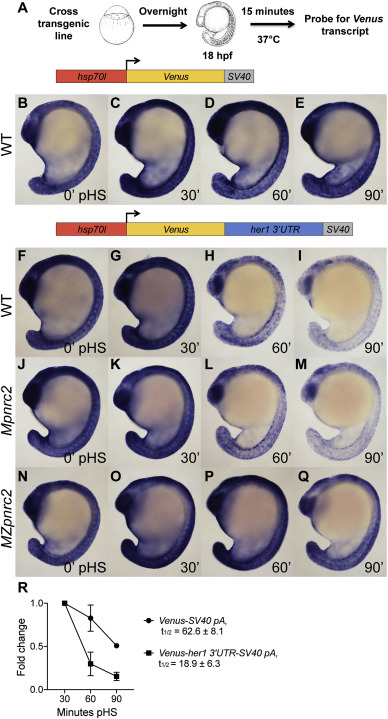Fig. 2 Fig. 2. The her1 3′UTR confers Pnrc2-mediated instability to reporter transcripts. (A) Diagram illustrating the heat shock protocol used for transgenic lines in this study. (B–I) Transgenic embryos carrying the hsp70l:Venus-her1 3′UTR-SV40 pA reporter (line oz44) or hsp70l:Venus-SV40 pA reporter (line oz68) were raised to mid-segmentation stage, heat shocked for 15 min, then collected at the indicated minutes pHS and processed by Venus in situ hybridization (n ≥ 7 embryos per time point). Venus transcript is not detected in the absence of heat shock (n = 10 per reporter line) (data not shown). (J–Q) Mid-segmentation stage Mpnrc2 mutant embryos and MZpnrc2 mutant embryos carrying the hsp70l:Venus-her1 3′UTR-SV40 pA reporter (line oz44) were heat shocked and processed by Venus in situ hybridization as above (n ≥ 8 embryos per time point). Representative embryos were genotyped post-imaging to confirm genotype. (R) qPCR analysis comparing Venus transcript fold change from 30 min pHS to 60 and 90 min pHS for the Tg(hsp70l:Venus-her1 3′UTR-SV40 pA)oz44 and Tg(hsp70l:Venus-SV40 pA)oz68 reporter lines (n = 10 embryos per time point across three biological replicates). Three independent lines carrying the hsp70l:Venus-her1 3′UTR-SV40 pA reporter and five independent lines carrying the hsp70l:Venus-SV40 pA reporter were analyzed in wild-type embryos by in situ hybridization and exhibited comparable Venus decay across all lines carrying the same reporter (data not shown); one representative line for each is shown (see Methods for details). For the hsp70l:Venus-her1 3′UTR-SV40 pA reporter, three independent lines were analyzed by qPCR and exhibited comparable decay (Supplemental Fig. 2). pHS = post-heat shock; hpf = hours post-fertilization; t1/2 = half-life; ± = standard deviation; pA = polyadenylation sequence.
Reprinted from Developmental Biology, 462, Tietz, K.T., Gallagher, T.L., Mannings, M.C., Morrow, Z.T., Derr, N.L., Amacher, S.L., Pumilio response and AU-rich elements drive rapid decay of Pnrc2-regulated cyclic gene transcripts, 129-140, Copyright (2020) with permission from Elsevier. Full text @ Dev. Biol.

